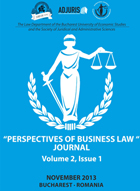THE CONTROL OF CONCENTRATIONS
THE CONTROL OF CONCENTRATIONS
Author(s): Ovidiu Horia MaicanSubject(s): Law, Constitution, Jurisprudence
Published by: Societatea de Stiinte Juridice si Administrative
Keywords: economic concentrations; competition; fair competition; Comission
Summary/Abstract: Concentrations of companies have developed in the last 40 years, as an effect of open borders within the European Union. The question from the point of view of competition is if setting up a new group or entity may have the same restrictive effects of an agreement. In addition, that may lead to monopoly or oligopoly, which prevents effective competition. Concentrations are situations when one or more companies acquire control of other companies, changing the structure of the companies involved and of the market. The most important forms of concentrations of undertakings are the holding by a company of the capital of another company or of other companies, the total or partial acquisitions by a company of the assets of other companies and the merger of two or more companies which are legally independent into a new company. Sometimes, where the concentration in an industry exceeds certain limits it can lead to monopoly or oligopoly structures, which restrict competition and jeopardise consumers' interests. The legal basis for EU merger control is Council Regulation (EC) No 139/2004. The regulation prohibits mergers and acquisitions which would significantly reduce competition in the Single Market, if they would create dominant companies and are likely to raise prices for consumers.
Journal: Perspectives of Business Law Journal
- Issue Year: 2013
- Issue No: 02
- Page Range: 133-142
- Page Count: 10
- Language: English

